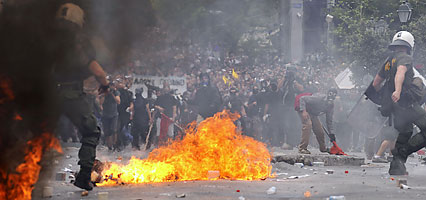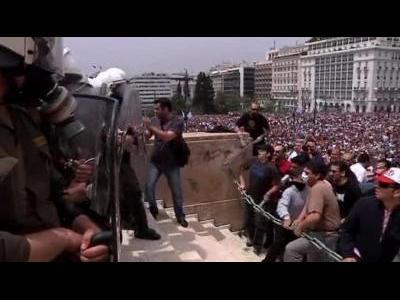ATHENS, Greece – Deadly riots over harsh new austerity measures engulfed the streets of Athens on Wednesday, killing three bank workers as angry protesters tried to storm parliament, hurled Molotov cocktails at police and torched buildings.
Tens of thousands of people took to the streets as part of nationwide strikes to protest new taxes and government spending cuts demanded by the International Monetary Fund and other European nations before heavily indebted Greece gets a euro110 billion ($141 billion) bailout package of loans to keep it from defaulting.
The three bank workers — a man and two women — died after demonstrators set their bank on fire along the main demonstration route in central Athens. As their colleagues sobbed in the street, five other bank workers were rescued from the balcony of the burning building.
"A demonstration is one thing and murder is quite another!" Prime Minister George Papandreou thundered in Parliament during a session to discuss the spending cuts he announced Sunday — measures even the IMF has called draconian. Lawmakers held a minute of silence for the dead — the first deaths during a protest in Greece since 1991.
"We are all concerned by Greece's economic and budgetary situation but at this time our thoughts are with the human victims in Athens," European Union President Herman Van Rompuy said in Brussels.
German Chancellor Angela Merkel called the bailout critical for all ofEurope.
"Nothing less than the future of Europe, and with that the future ofGermany in Europe, is at stake," Merkel told lawmakers in Berlin, urging them to quickly pass the country's share of the bailout — euro22 billion ($28 billion) over three years — by Friday. "We are at a fork in the road."
European Union officials tried to calm market fears that Greece's debt crisis was spreading to the rest of Europe, insisting the debt-ridden country is a "unique case" combining profligacy and tampered accounts. Van Rompuy said the situation inSpain and Portugal has "absolutely nothing to do with the situation in Greece."
"Greece is a unique and particular case in the EU" because of its "precarious debt dynamics" and because it "has cheated with its statistics for years and years," EU Commissioner Olli Rehn said in Brussels.
But Moody's Investor Services, a major ratings agency, put Portugal's bond rating on review for possible downgrade Wednesday. Spanish and Portuguese bonds and stocks slumped further on the news, reflecting fears that they may likewise have trouble repaying their debt and that the eurozone would have to extend even larger bailouts to them.
On the streets of Athens, demonstrators chanted "Thieves, thieves!" as they attempted to break through a riot police cordon guarding Parliament and chased ceremonial guards away from the Tomb of the Unknown Soldierin front of the building.
Tear gas drifted across the city center as rioters hurled paving stones and fire bombs at police. Firefighters extinguished blazes in at least two buildings — the bank and a branch of the Finance Ministry — while protesters set up burning barricades and torched cars and a fire truck.
Police said 12 people were injured in the riots.
The marches came amid a 24-hour nationwide general strike that grounded all flights to and from Greece, shut down ports, schools and government services, and left hospitals working with emergency medical staff. The Acropolis and all other ancient sites were closed and journalists also walked off the job, suspending television and radio news broadcasts.
But media later broke the strike to report on the deaths and the violent protests.
Violence also broke out in the northern city of Thessaloniki, where another 20,000 people marched through the city center, with youths smashing windows of stores and fast food restaurants.
Union reaction until now had been relatively muted by Greece's volatile standards, despite several previous strikes. But anger mounted after Papandreou announced cuts in salaries and pensions for civil servants, and another round of consumer tax increases.
Papandreou said he has no choice but to implement the measures if Greece was to avoid bankruptcy.
"There was only one other solution. For the country to default, taking the citizenry with it. And that would not have affected the rich, it would have affected workers and pensioners," he told Parliament on Wednesday. "That was a real possibility, however nightmarish."
Under the bailout package, Greece will receive loans over three years from the IMF and the other 15 eurozone countries. The rescue aims to prevent Athens' debt troubles from becoming a wider crisis for the euro by engulfing other financially troubled countries such as Spain and Portugal. Greece faces a May 19 due date on debt it says it can't repay without the help.
But the rioting underlined skepticism that the Greek government could keep up its end of the bargain, helping drive the euro below $1.29 for the first time in over a year.
Even with the bailout, many economists think Greece will eventually default on or restructure its debts because its prospects for economic growth are so poor over the next several years, hurting government revenue. Some fear the austerity measures insisted upon by the EU and IMF could even make the growth situation worse by depriving the economy of stimulus from government spending — even as it helps reduce the deficit.
Greek unions concede that the cash-strapped government was forced to increase consumer taxes and slash spending, including cutting salaries and pensions for civil servants.
But they say low-income Greeks will suffer disproportionately from the measures, which aim to save euro30 billion ($40 billion) — the country's current budget deficit — through 2012.
"These people are losing their rights, they are losing their future," said Yiannis Panagopoulos, head of GSEE, one of the two largest union organizations. "The country cannot surrender without a fight."
IMF head Dominique Strauss-Kahn warned that the crisis could spread to other countries despite the rescue package's efforts to contain it.
"Everyone must remain extremely vigilant," to this risk, Strauss-Kahn said in an interview published in French newspaper Le Parisien Wednesday.
"I completely understand the Greek populations' anger, its incomprehension at the size of the economic catastrophe," Strauss-Kahn said. But Greeks must also understand that without these measures, "the situation would be infinitely more serious," he said.
The draft bill of the new austerity measures is to be voted on Thursday. Papandreou's Socialists hold a comfortable majority of 160 in the 300-seat Parliament, and with a simple majority of 151 votes needed, the bill is expected to be passed easily.
___
APTN crews in Athens and Associated Press writers Nicholas Paphitis in Athens, Greg Keller in Paris and Raf Casert in Brussels contributed.
http://news.yahoo.com/s/ap/20100505/ap_on_bi_ge/eu_greece_financial_crisis





Tidak ada komentar:
Posting Komentar